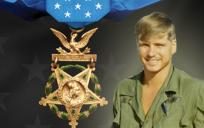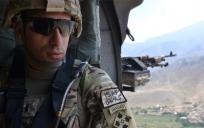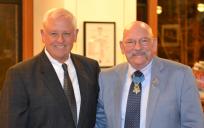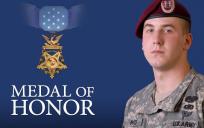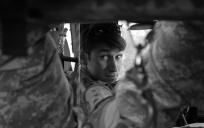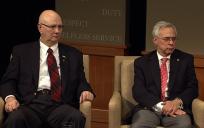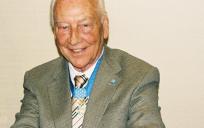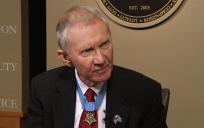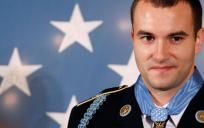
Record date:
Medal of Honor Recipient Thomas G. Kelley Interview
It was the worst possible time to break down. On June 15, 1969, Lt. Thomas G. Kelley was leading a column of eight Navy river assault craft along the rivers and canals of the Mekong Delta. But only moments after one of the carriers broke down, unable to move, it came under heavy fire from the bank of the river. They needed time to fix the problem. Kelley saw no choice; he moved his own craft between the stricken carrier and the Viet Cong, directly into the line of fire.
Kelley's first service was during the Cuban Missile Crisis in the Caribbean. A few years later, the Boston native volunteered to serve with the U.S. Navy's River Assault Division in Vietnam. His bravery under fire would come at a very high cost: shrapnel tore through the armor protecting his command area and knocked him to the deck below. Unable to move and barely able to speak, Kelley continued to direct the battle until the carrier was repaired and able to move again; only then did Kelley lose consciousness and fall into a coma. The shrapnel had destroyed one of his eyes and part of his skull. After reconstructive surgery, Kelley was declared physically unfit for duty, but he lobbied for - and was granted - a return to service.
Kelley received the Medal of Honor on May 14, 1970. He retired from the U.S. Navy as a captain in 1990 and worked as a civilian in the Department of Defense for several years. He currently serves as Secretary of the Massachusetts Department of Veterans' Services.
"We are extremely honored that Capt. Kelley is joining us for this special event," said Ryan Yantis, Executive Director of the Pritzker Military Library. "Having an interview with a Medal of Honor recipient for our 200th public event marks an important milestone for our Library. It is also very fitting that Ed Tracy, our Executive Producer for Programs, is hosting this interview. Ed's exceptional work on our programs, events and collections has been vital to our success."
His Citation Reads:
Rank and organization: Lieutenant Commander, U.S. Navy, River Assault Division 152. place and date: Ong Muong Canal, Kien Hoa province, Republic of Vietnam, 15 June 1969. Entered service at: Boston, Mass. Born: 13 May 1939, Boston, Mass. Citation: For conspicuous gallantry and intrepidity at the risk of his life above and beyond the call of duty in the afternoon while serving as commander of River Assault Division 152 during combat operations against enemy aggressor forces. Lt. Comdr. (then Lt.) Kelley was in charge of a column of eight river assault craft which were extracting one company of U.S. Army infantry troops on the east bank of the Ong Muong Canal in Kien Hoa province, when one of the armored troop carriers reported a mechanical failure of a loading ramp. At approximately the same time, Viet Cong forces opened fire from the opposite bank of the canal. After issuing orders for the crippled troop carrier to raise its ramp manually, and for the remaining boats to form a protective cordon around the disabled craft, Lt. Comdr. Kelley realizing the extreme danger to his column and its inability to clear the ambush site until the crippled unit was repaired, boldly maneuvered the monitor in which he was embarked to the exposed side of the protective cordon in direct line with the enemy's fire, and ordered the monitor to commence firing. Suddenly, an enemy rocket scored a direct hit on the coxswain's flat, the shell penetrating the thick armor plate, and the explosion spraying shrapnel in all directions. Sustaining serious head wounds from the blast, which hurled him to the deck of the monitor, Lt. Cmdr. Kelley disregarded his severe injuries and attempted to continue directing the other boats. Although unable to move from the deck or to speak clearly into the radio, he succeeded in relaying his commands through one of his men until the enemy attack was silenced and the boats were able to move to an area of safety. Lt. Comdr. Kelley's brilliant leadership, bold initiative, and resolute determination served to inspire his men and provide the impetus needed to carry out the mission after he was medically evacuated by helicopter. His extraordinary courage under fire, and his selfless devotion to duty sustain and enhance the finest traditions of the U.S. Naval Service.

